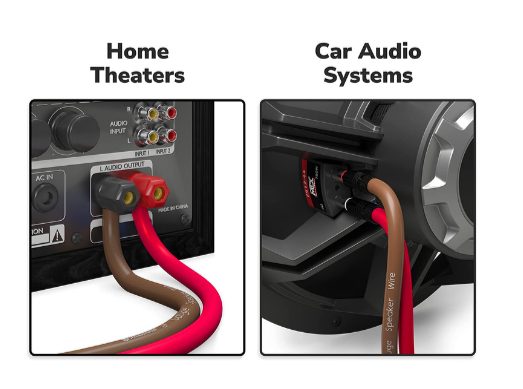How Many Watts can a 16 Gauge Speaker Wire Handle?

In a speaker system, it is crucial to know the proper gauge wire you should use for it to function properly and support the system’s requirements for electrical current. Using the wrong wire gauge could provide insufficient power and lead to safety and fire hazards.
In general, 16 gauge speaker wires can handle 75-100 watts for longer car or home radio speaker runs and shorter runs under 20 feet. They can also take under 225 watts for low-power subwoofers with short lengths.
In this handy guide, I’m going to teach you how many watts a 16 gauge speaker wire can handle and what you need to know about these types of wires in regards to their specifications and abilities.
Number of Watts That 16 Gauge Speaker Wire Can Handle

A 16 gauge car audio speaker wire can handle 75-100 watts. It is commonly used for longer runs on automobile and home radio speakers or shorter runs under 20 feet. Also, it can handle under 225 watts, such as moderate power subwoofers with short lengths. Hence, a 16 gauge wire is an excellent option for systems with more power or longer lengths.
Choosing the Right Wire Gauge
These three factors determine the proper speaker wire gauge to use:
- The power output of your stereo or amplifier.
- The nominal impedance, or speaker impedance.
- The length of cable required for your speaker setup.
For a 16 gauge car audio speaker wire, the maximum recommended speaker wire length depending on its speaker impedance (Ohms load) is the following: (1)
| 16 Gauge Wire Type | 2Ω Speaker | 4Ω Speaker | 6Ω Speaker | 8Ω Speaker | 16Ω Speaker |
| Copper Speaker Wire | 12 ft (3.6 m) | 23 ft (7.2 m) | 35 ft (10.7 m) | 47 ft (14.3 m) | 94 ft (28.7 m) |
| Copper Clad Aluminum (CCA) Wire | 9 ft (2.6 m) | 17 ft (5.2 m) | 26 ft (7.8 m) | 34 ft (10.5 m) | 69 ft (20.9 m) |
FAQs
What are the uses of 16 gauge speaker wires?
Generally speaking, you can find a 16 gauge wire in extension cords and is utilized in all situations where extension cords are typically employed, including connecting appliances throughout the house, using leaf blowers, and trimming hedges. Vehicles can sometimes contain significant amounts of these wires, located in their headlights, turn signals, starter, parking lights, ignition coil, and alternators.
How many amps can a 16 gauge wire handle?
A 16 gauge speaker wire can carry 13 amps. also, according to the National Electrical Code (NEC), a 16 gauge wire can conduct 18 Amps at a temperature of 90 degrees Celsius.
Are all applications for 16 gauge copper wire limited to 13 amps?
A 16 gauge wire can take 18 amps at a temperature of 90 degrees Celsius under the NEC. However, extension cables frequently employ it at a reduced ampacity. Applications for cars are entirely different because they can carry more current than is expected or what is specified in the NEC, such as: (2)
– 3 feet is 50 amps
– 5 feet is 30 amps
– 10 feet is between 18 and 30 amps
– 20 feet is 8 to 12 amps
– 25 feet is 8 to 10 amps
Can 16 gauge wire be tied into 18 or 14-gauge wire?
Legally, a wire must be at least 14 gauge to be used with AC (alternating current). Therefore, connecting a 16 gauge wire to a 14 gauge wire from a circuit breaker is very dangerous. However, mixing 14, 16, and 18 gauge wires in audio applications such as inside a vehicle is permitted. Just ensure that they are adequately insulated. The most common applications for 18 gauge, like 16 gauge, are in the automotive and stereo industries wherein DC (direct current) batteries always power them.
Take a look at some of our related articles below.
- How thick is 18 gauge wire
- What gauge wire from battery to starter
- What gauge speaker wire for subwoofer
References
(1) Ohms – https://www.techtarget.com/whatis/definition/ohm
(2) Celsius – https://www.britannica.com/technology/Celsius-temperature-scale
